A Critical Comparison of Two Research Approaches in Healthcare Studies
VerifiedAdded on 2020/06/04
|9
|2583
|31
Report
AI Summary
This report provides a critical comparison of two distinct research approaches. The first study, employing a quantitative approach, investigates the reasons behind the refusal of renal transplantation among Sudanese adults undergoing hemodialysis. The second study, utilizing a qualitative approach and grounded theory, examines factors influencing decisions to continue nocturnal hemodialysis rather than undergo kidney transplantation. The report analyzes the research questions, methodologies, sampling techniques (convenience and purposive), data collection methods (questionnaires and telephone interviews), and the types of data collected (numerical/descriptive and descriptive, respectively). The comparison highlights the strengths and weaknesses of each approach, offering insights into their suitability for addressing specific research questions in healthcare, particularly concerning patient choices related to renal disease treatments.
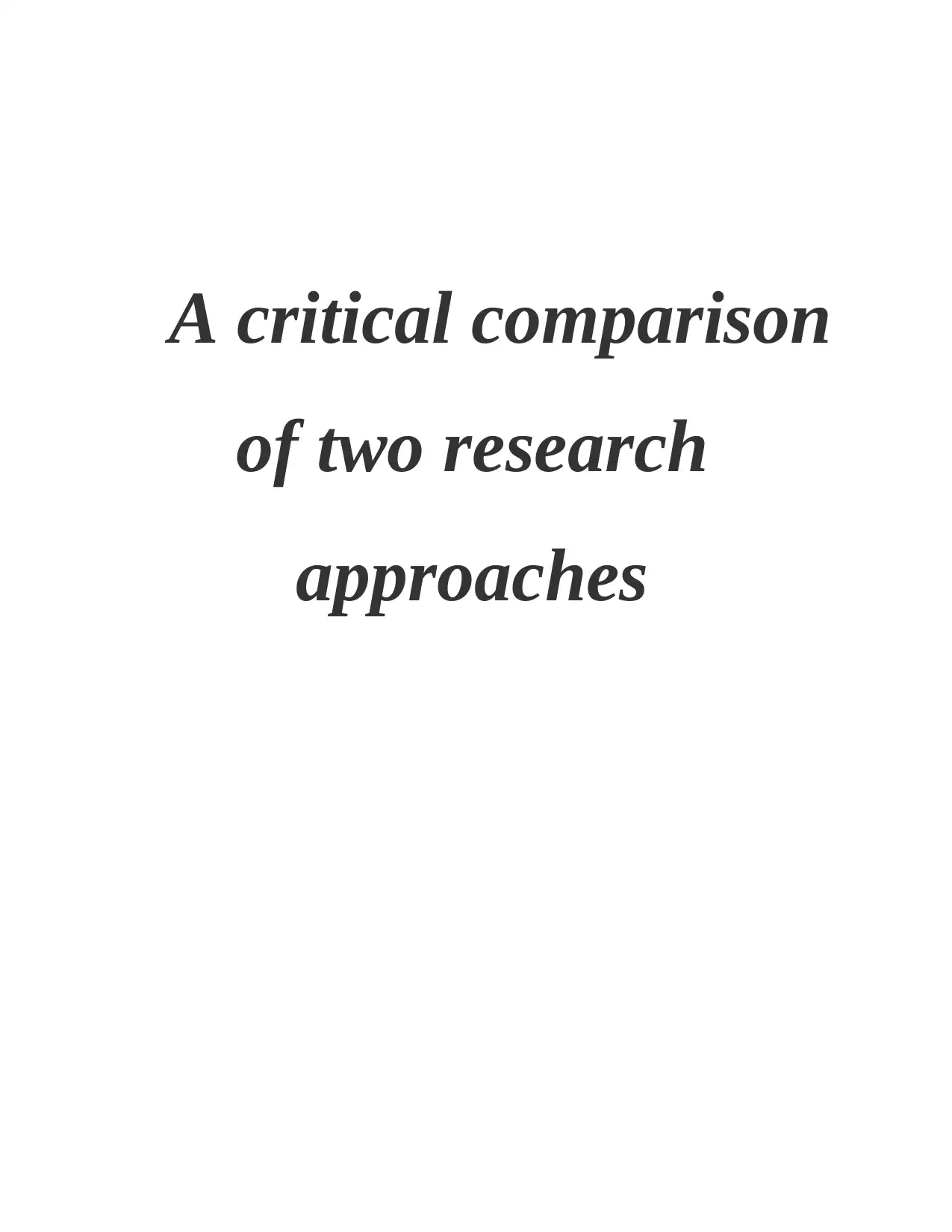
A critical comparison
of two research
approaches
of two research
approaches
Paraphrase This Document
Need a fresh take? Get an instant paraphrase of this document with our AI Paraphraser
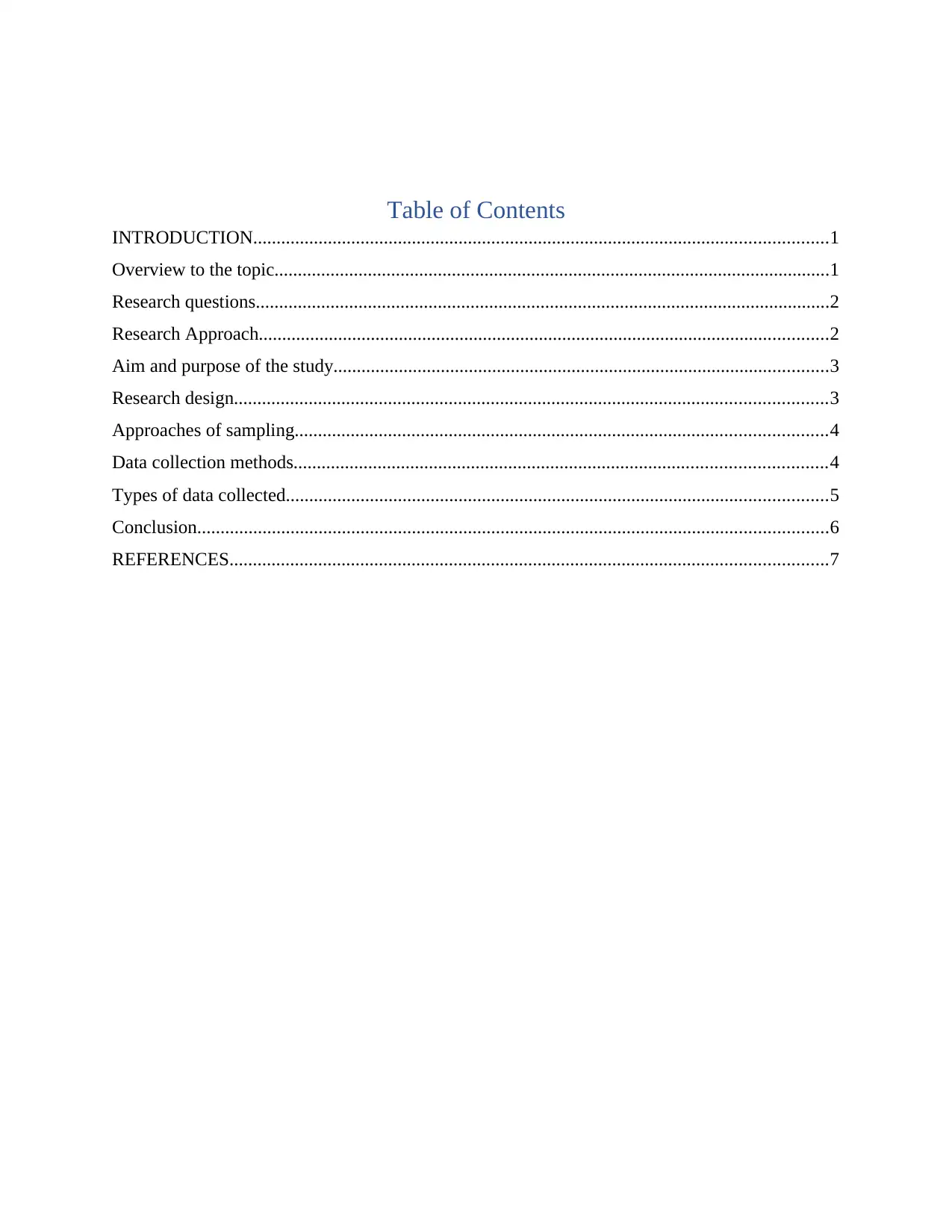
Table of Contents
INTRODUCTION...........................................................................................................................1
Overview to the topic.......................................................................................................................1
Research questions...........................................................................................................................2
Research Approach..........................................................................................................................2
Aim and purpose of the study..........................................................................................................3
Research design...............................................................................................................................3
Approaches of sampling..................................................................................................................4
Data collection methods..................................................................................................................4
Types of data collected....................................................................................................................5
Conclusion.......................................................................................................................................6
REFERENCES................................................................................................................................7
INTRODUCTION...........................................................................................................................1
Overview to the topic.......................................................................................................................1
Research questions...........................................................................................................................2
Research Approach..........................................................................................................................2
Aim and purpose of the study..........................................................................................................3
Research design...............................................................................................................................3
Approaches of sampling..................................................................................................................4
Data collection methods..................................................................................................................4
Types of data collected....................................................................................................................5
Conclusion.......................................................................................................................................6
REFERENCES................................................................................................................................7
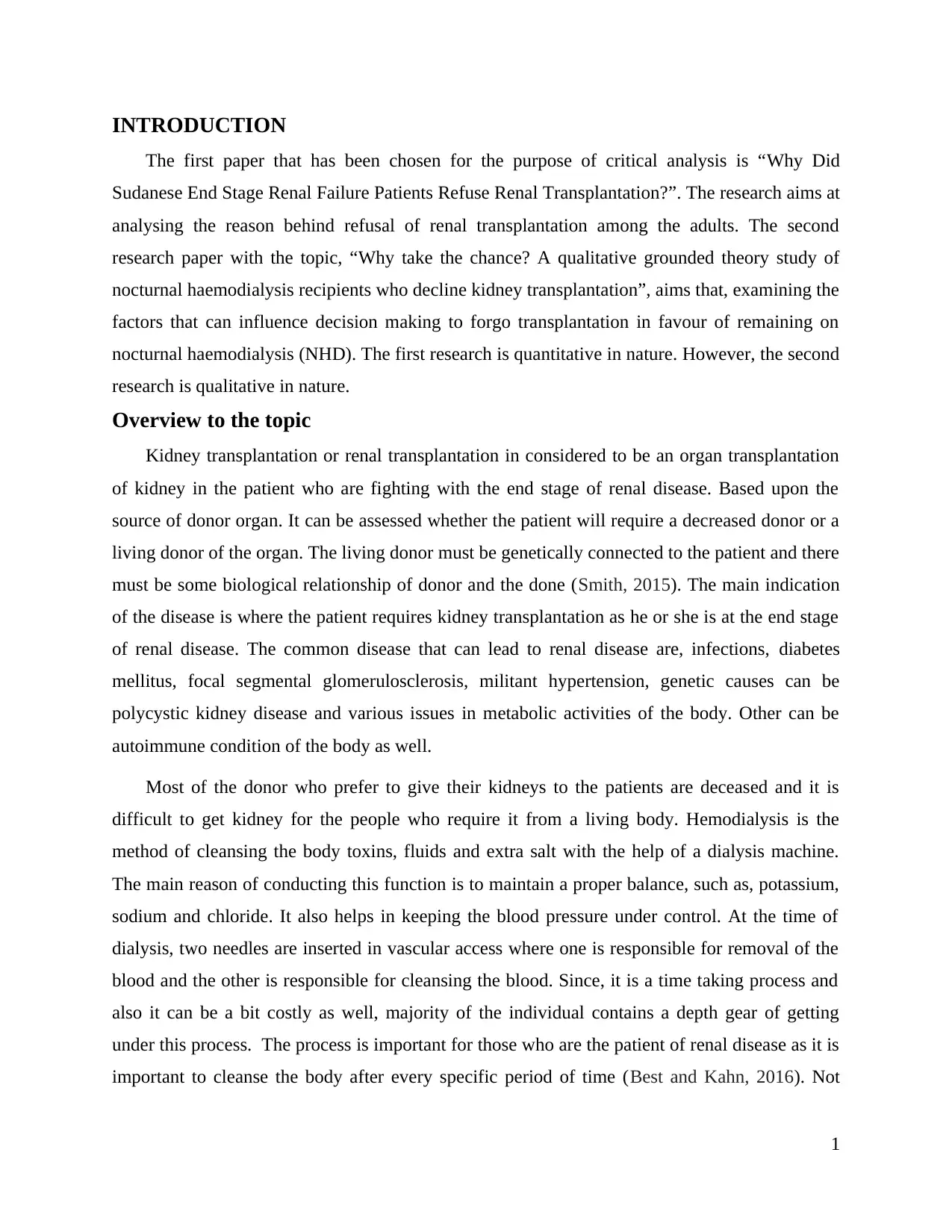
INTRODUCTION
The first paper that has been chosen for the purpose of critical analysis is “Why Did
Sudanese End Stage Renal Failure Patients Refuse Renal Transplantation?”. The research aims at
analysing the reason behind refusal of renal transplantation among the adults. The second
research paper with the topic, “Why take the chance? A qualitative grounded theory study of
nocturnal haemodialysis recipients who decline kidney transplantation”, aims that, examining the
factors that can influence decision making to forgo transplantation in favour of remaining on
nocturnal haemodialysis (NHD). The first research is quantitative in nature. However, the second
research is qualitative in nature.
Overview to the topic
Kidney transplantation or renal transplantation in considered to be an organ transplantation
of kidney in the patient who are fighting with the end stage of renal disease. Based upon the
source of donor organ. It can be assessed whether the patient will require a decreased donor or a
living donor of the organ. The living donor must be genetically connected to the patient and there
must be some biological relationship of donor and the done (Smith, 2015). The main indication
of the disease is where the patient requires kidney transplantation as he or she is at the end stage
of renal disease. The common disease that can lead to renal disease are, infections, diabetes
mellitus, focal segmental glomerulosclerosis, militant hypertension, genetic causes can be
polycystic kidney disease and various issues in metabolic activities of the body. Other can be
autoimmune condition of the body as well.
Most of the donor who prefer to give their kidneys to the patients are deceased and it is
difficult to get kidney for the people who require it from a living body. Hemodialysis is the
method of cleansing the body toxins, fluids and extra salt with the help of a dialysis machine.
The main reason of conducting this function is to maintain a proper balance, such as, potassium,
sodium and chloride. It also helps in keeping the blood pressure under control. At the time of
dialysis, two needles are inserted in vascular access where one is responsible for removal of the
blood and the other is responsible for cleansing the blood. Since, it is a time taking process and
also it can be a bit costly as well, majority of the individual contains a depth gear of getting
under this process. The process is important for those who are the patient of renal disease as it is
important to cleanse the body after every specific period of time (Best and Kahn, 2016). Not
1
The first paper that has been chosen for the purpose of critical analysis is “Why Did
Sudanese End Stage Renal Failure Patients Refuse Renal Transplantation?”. The research aims at
analysing the reason behind refusal of renal transplantation among the adults. The second
research paper with the topic, “Why take the chance? A qualitative grounded theory study of
nocturnal haemodialysis recipients who decline kidney transplantation”, aims that, examining the
factors that can influence decision making to forgo transplantation in favour of remaining on
nocturnal haemodialysis (NHD). The first research is quantitative in nature. However, the second
research is qualitative in nature.
Overview to the topic
Kidney transplantation or renal transplantation in considered to be an organ transplantation
of kidney in the patient who are fighting with the end stage of renal disease. Based upon the
source of donor organ. It can be assessed whether the patient will require a decreased donor or a
living donor of the organ. The living donor must be genetically connected to the patient and there
must be some biological relationship of donor and the done (Smith, 2015). The main indication
of the disease is where the patient requires kidney transplantation as he or she is at the end stage
of renal disease. The common disease that can lead to renal disease are, infections, diabetes
mellitus, focal segmental glomerulosclerosis, militant hypertension, genetic causes can be
polycystic kidney disease and various issues in metabolic activities of the body. Other can be
autoimmune condition of the body as well.
Most of the donor who prefer to give their kidneys to the patients are deceased and it is
difficult to get kidney for the people who require it from a living body. Hemodialysis is the
method of cleansing the body toxins, fluids and extra salt with the help of a dialysis machine.
The main reason of conducting this function is to maintain a proper balance, such as, potassium,
sodium and chloride. It also helps in keeping the blood pressure under control. At the time of
dialysis, two needles are inserted in vascular access where one is responsible for removal of the
blood and the other is responsible for cleansing the blood. Since, it is a time taking process and
also it can be a bit costly as well, majority of the individual contains a depth gear of getting
under this process. The process is important for those who are the patient of renal disease as it is
important to cleanse the body after every specific period of time (Best and Kahn, 2016). Not
1
⊘ This is a preview!⊘
Do you want full access?
Subscribe today to unlock all pages.

Trusted by 1+ million students worldwide
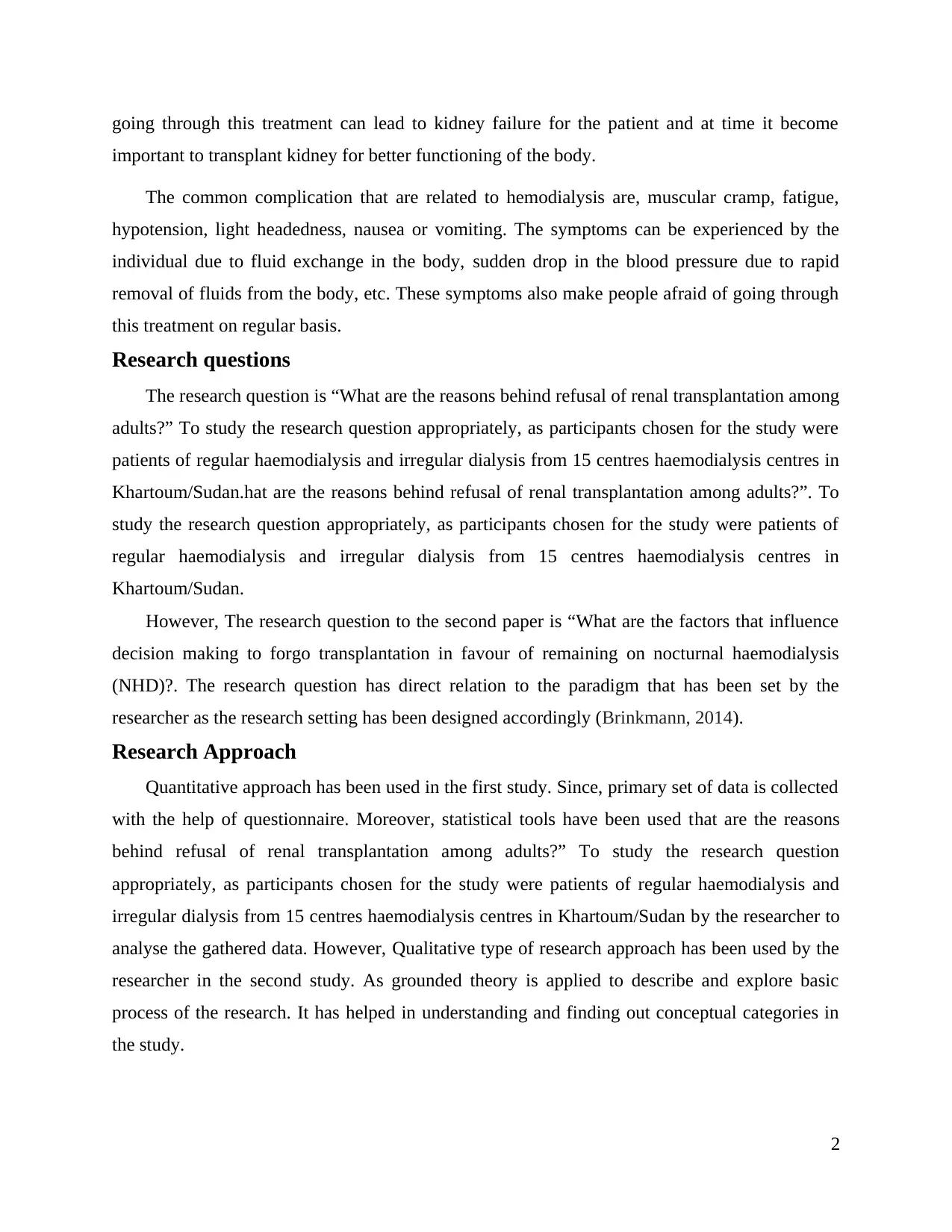
going through this treatment can lead to kidney failure for the patient and at time it become
important to transplant kidney for better functioning of the body.
The common complication that are related to hemodialysis are, muscular cramp, fatigue,
hypotension, light headedness, nausea or vomiting. The symptoms can be experienced by the
individual due to fluid exchange in the body, sudden drop in the blood pressure due to rapid
removal of fluids from the body, etc. These symptoms also make people afraid of going through
this treatment on regular basis.
Research questions
The research question is “What are the reasons behind refusal of renal transplantation among
adults?” To study the research question appropriately, as participants chosen for the study were
patients of regular haemodialysis and irregular dialysis from 15 centres haemodialysis centres in
Khartoum/Sudan.hat are the reasons behind refusal of renal transplantation among adults?”. To
study the research question appropriately, as participants chosen for the study were patients of
regular haemodialysis and irregular dialysis from 15 centres haemodialysis centres in
Khartoum/Sudan.
However, The research question to the second paper is “What are the factors that influence
decision making to forgo transplantation in favour of remaining on nocturnal haemodialysis
(NHD)?. The research question has direct relation to the paradigm that has been set by the
researcher as the research setting has been designed accordingly (Brinkmann, 2014).
Research Approach
Quantitative approach has been used in the first study. Since, primary set of data is collected
with the help of questionnaire. Moreover, statistical tools have been used that are the reasons
behind refusal of renal transplantation among adults?” To study the research question
appropriately, as participants chosen for the study were patients of regular haemodialysis and
irregular dialysis from 15 centres haemodialysis centres in Khartoum/Sudan by the researcher to
analyse the gathered data. However, Qualitative type of research approach has been used by the
researcher in the second study. As grounded theory is applied to describe and explore basic
process of the research. It has helped in understanding and finding out conceptual categories in
the study.
2
important to transplant kidney for better functioning of the body.
The common complication that are related to hemodialysis are, muscular cramp, fatigue,
hypotension, light headedness, nausea or vomiting. The symptoms can be experienced by the
individual due to fluid exchange in the body, sudden drop in the blood pressure due to rapid
removal of fluids from the body, etc. These symptoms also make people afraid of going through
this treatment on regular basis.
Research questions
The research question is “What are the reasons behind refusal of renal transplantation among
adults?” To study the research question appropriately, as participants chosen for the study were
patients of regular haemodialysis and irregular dialysis from 15 centres haemodialysis centres in
Khartoum/Sudan.hat are the reasons behind refusal of renal transplantation among adults?”. To
study the research question appropriately, as participants chosen for the study were patients of
regular haemodialysis and irregular dialysis from 15 centres haemodialysis centres in
Khartoum/Sudan.
However, The research question to the second paper is “What are the factors that influence
decision making to forgo transplantation in favour of remaining on nocturnal haemodialysis
(NHD)?. The research question has direct relation to the paradigm that has been set by the
researcher as the research setting has been designed accordingly (Brinkmann, 2014).
Research Approach
Quantitative approach has been used in the first study. Since, primary set of data is collected
with the help of questionnaire. Moreover, statistical tools have been used that are the reasons
behind refusal of renal transplantation among adults?” To study the research question
appropriately, as participants chosen for the study were patients of regular haemodialysis and
irregular dialysis from 15 centres haemodialysis centres in Khartoum/Sudan by the researcher to
analyse the gathered data. However, Qualitative type of research approach has been used by the
researcher in the second study. As grounded theory is applied to describe and explore basic
process of the research. It has helped in understanding and finding out conceptual categories in
the study.
2
Paraphrase This Document
Need a fresh take? Get an instant paraphrase of this document with our AI Paraphraser
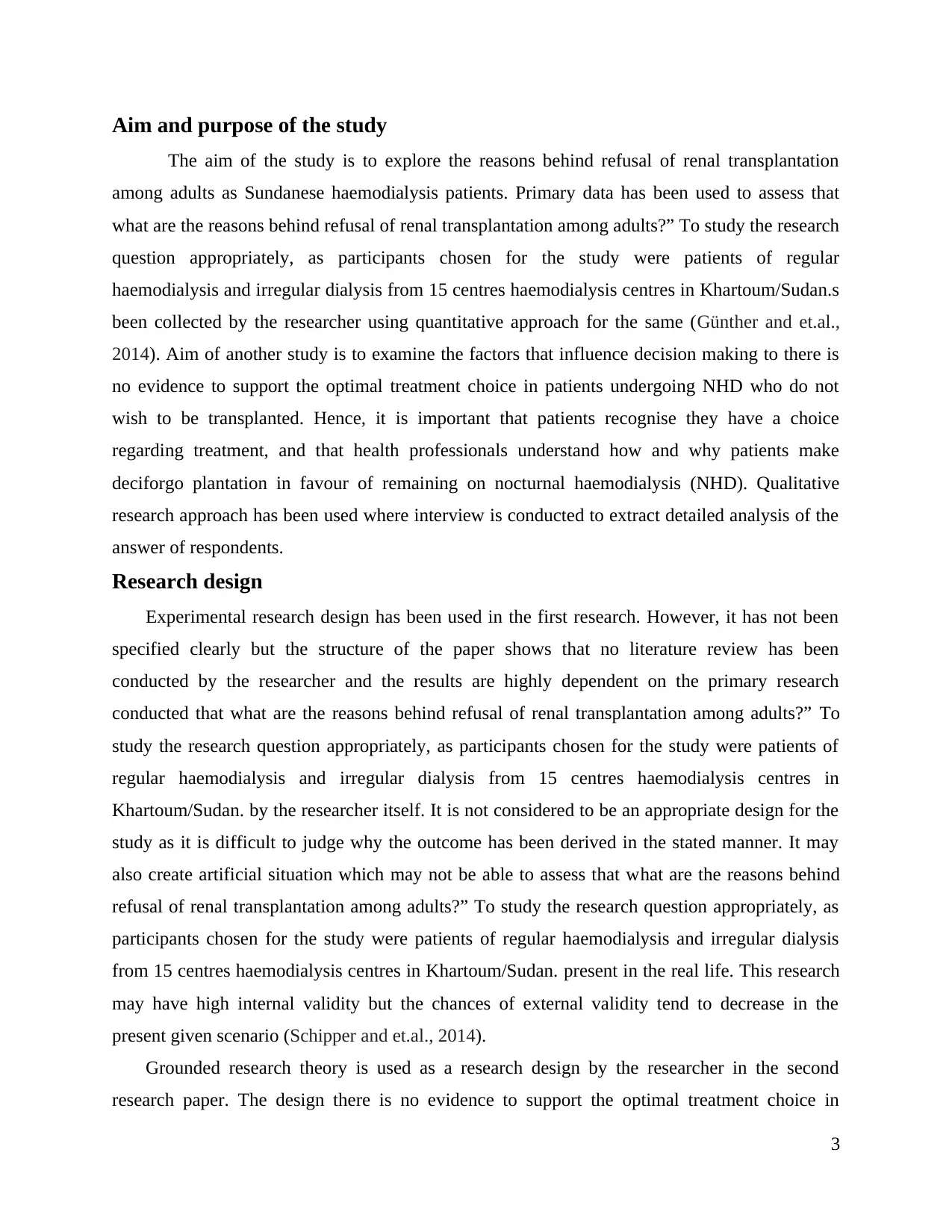
Aim and purpose of the study
The aim of the study is to explore the reasons behind refusal of renal transplantation
among adults as Sundanese haemodialysis patients. Primary data has been used to assess that
what are the reasons behind refusal of renal transplantation among adults?” To study the research
question appropriately, as participants chosen for the study were patients of regular
haemodialysis and irregular dialysis from 15 centres haemodialysis centres in Khartoum/Sudan.s
been collected by the researcher using quantitative approach for the same (Günther and et.al.,
2014). Aim of another study is to examine the factors that influence decision making to there is
no evidence to support the optimal treatment choice in patients undergoing NHD who do not
wish to be transplanted. Hence, it is important that patients recognise they have a choice
regarding treatment, and that health professionals understand how and why patients make
deciforgo plantation in favour of remaining on nocturnal haemodialysis (NHD). Qualitative
research approach has been used where interview is conducted to extract detailed analysis of the
answer of respondents.
Research design
Experimental research design has been used in the first research. However, it has not been
specified clearly but the structure of the paper shows that no literature review has been
conducted by the researcher and the results are highly dependent on the primary research
conducted that what are the reasons behind refusal of renal transplantation among adults?” To
study the research question appropriately, as participants chosen for the study were patients of
regular haemodialysis and irregular dialysis from 15 centres haemodialysis centres in
Khartoum/Sudan. by the researcher itself. It is not considered to be an appropriate design for the
study as it is difficult to judge why the outcome has been derived in the stated manner. It may
also create artificial situation which may not be able to assess that what are the reasons behind
refusal of renal transplantation among adults?” To study the research question appropriately, as
participants chosen for the study were patients of regular haemodialysis and irregular dialysis
from 15 centres haemodialysis centres in Khartoum/Sudan. present in the real life. This research
may have high internal validity but the chances of external validity tend to decrease in the
present given scenario (Schipper and et.al., 2014).
Grounded research theory is used as a research design by the researcher in the second
research paper. The design there is no evidence to support the optimal treatment choice in
3
The aim of the study is to explore the reasons behind refusal of renal transplantation
among adults as Sundanese haemodialysis patients. Primary data has been used to assess that
what are the reasons behind refusal of renal transplantation among adults?” To study the research
question appropriately, as participants chosen for the study were patients of regular
haemodialysis and irregular dialysis from 15 centres haemodialysis centres in Khartoum/Sudan.s
been collected by the researcher using quantitative approach for the same (Günther and et.al.,
2014). Aim of another study is to examine the factors that influence decision making to there is
no evidence to support the optimal treatment choice in patients undergoing NHD who do not
wish to be transplanted. Hence, it is important that patients recognise they have a choice
regarding treatment, and that health professionals understand how and why patients make
deciforgo plantation in favour of remaining on nocturnal haemodialysis (NHD). Qualitative
research approach has been used where interview is conducted to extract detailed analysis of the
answer of respondents.
Research design
Experimental research design has been used in the first research. However, it has not been
specified clearly but the structure of the paper shows that no literature review has been
conducted by the researcher and the results are highly dependent on the primary research
conducted that what are the reasons behind refusal of renal transplantation among adults?” To
study the research question appropriately, as participants chosen for the study were patients of
regular haemodialysis and irregular dialysis from 15 centres haemodialysis centres in
Khartoum/Sudan. by the researcher itself. It is not considered to be an appropriate design for the
study as it is difficult to judge why the outcome has been derived in the stated manner. It may
also create artificial situation which may not be able to assess that what are the reasons behind
refusal of renal transplantation among adults?” To study the research question appropriately, as
participants chosen for the study were patients of regular haemodialysis and irregular dialysis
from 15 centres haemodialysis centres in Khartoum/Sudan. present in the real life. This research
may have high internal validity but the chances of external validity tend to decrease in the
present given scenario (Schipper and et.al., 2014).
Grounded research theory is used as a research design by the researcher in the second
research paper. The design there is no evidence to support the optimal treatment choice in
3
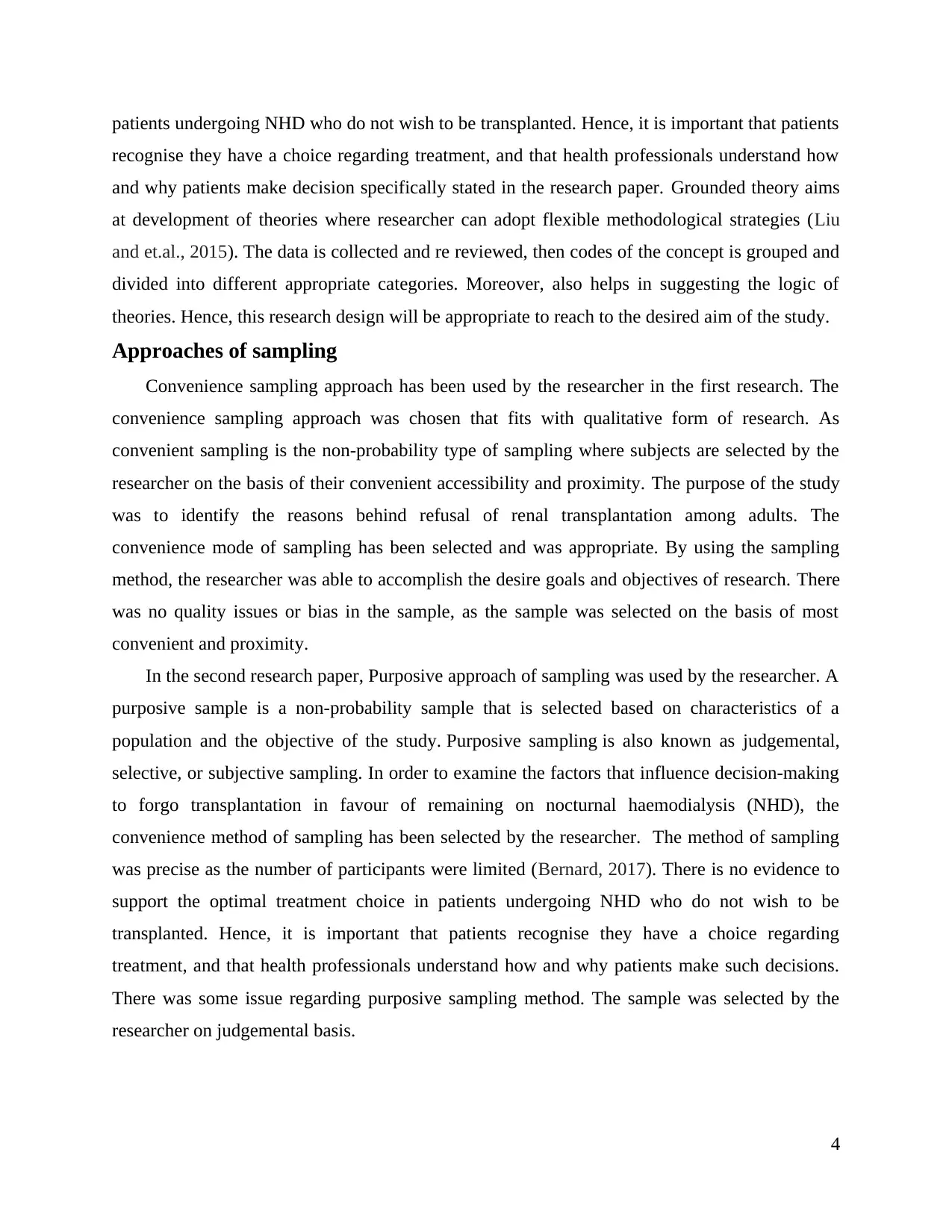
patients undergoing NHD who do not wish to be transplanted. Hence, it is important that patients
recognise they have a choice regarding treatment, and that health professionals understand how
and why patients make decision specifically stated in the research paper. Grounded theory aims
at development of theories where researcher can adopt flexible methodological strategies (Liu
and et.al., 2015). The data is collected and re reviewed, then codes of the concept is grouped and
divided into different appropriate categories. Moreover, also helps in suggesting the logic of
theories. Hence, this research design will be appropriate to reach to the desired aim of the study.
Approaches of sampling
Convenience sampling approach has been used by the researcher in the first research. The
convenience sampling approach was chosen that fits with qualitative form of research. As
convenient sampling is the non-probability type of sampling where subjects are selected by the
researcher on the basis of their convenient accessibility and proximity. The purpose of the study
was to identify the reasons behind refusal of renal transplantation among adults. The
convenience mode of sampling has been selected and was appropriate. By using the sampling
method, the researcher was able to accomplish the desire goals and objectives of research. There
was no quality issues or bias in the sample, as the sample was selected on the basis of most
convenient and proximity.
In the second research paper, Purposive approach of sampling was used by the researcher. A
purposive sample is a non-probability sample that is selected based on characteristics of a
population and the objective of the study. Purposive sampling is also known as judgemental,
selective, or subjective sampling. In order to examine the factors that influence decision-making
to forgo transplantation in favour of remaining on nocturnal haemodialysis (NHD), the
convenience method of sampling has been selected by the researcher. The method of sampling
was precise as the number of participants were limited (Bernard, 2017). There is no evidence to
support the optimal treatment choice in patients undergoing NHD who do not wish to be
transplanted. Hence, it is important that patients recognise they have a choice regarding
treatment, and that health professionals understand how and why patients make such decisions.
There was some issue regarding purposive sampling method. The sample was selected by the
researcher on judgemental basis.
4
recognise they have a choice regarding treatment, and that health professionals understand how
and why patients make decision specifically stated in the research paper. Grounded theory aims
at development of theories where researcher can adopt flexible methodological strategies (Liu
and et.al., 2015). The data is collected and re reviewed, then codes of the concept is grouped and
divided into different appropriate categories. Moreover, also helps in suggesting the logic of
theories. Hence, this research design will be appropriate to reach to the desired aim of the study.
Approaches of sampling
Convenience sampling approach has been used by the researcher in the first research. The
convenience sampling approach was chosen that fits with qualitative form of research. As
convenient sampling is the non-probability type of sampling where subjects are selected by the
researcher on the basis of their convenient accessibility and proximity. The purpose of the study
was to identify the reasons behind refusal of renal transplantation among adults. The
convenience mode of sampling has been selected and was appropriate. By using the sampling
method, the researcher was able to accomplish the desire goals and objectives of research. There
was no quality issues or bias in the sample, as the sample was selected on the basis of most
convenient and proximity.
In the second research paper, Purposive approach of sampling was used by the researcher. A
purposive sample is a non-probability sample that is selected based on characteristics of a
population and the objective of the study. Purposive sampling is also known as judgemental,
selective, or subjective sampling. In order to examine the factors that influence decision-making
to forgo transplantation in favour of remaining on nocturnal haemodialysis (NHD), the
convenience method of sampling has been selected by the researcher. The method of sampling
was precise as the number of participants were limited (Bernard, 2017). There is no evidence to
support the optimal treatment choice in patients undergoing NHD who do not wish to be
transplanted. Hence, it is important that patients recognise they have a choice regarding
treatment, and that health professionals understand how and why patients make such decisions.
There was some issue regarding purposive sampling method. The sample was selected by the
researcher on judgemental basis.
4
⊘ This is a preview!⊘
Do you want full access?
Subscribe today to unlock all pages.

Trusted by 1+ million students worldwide
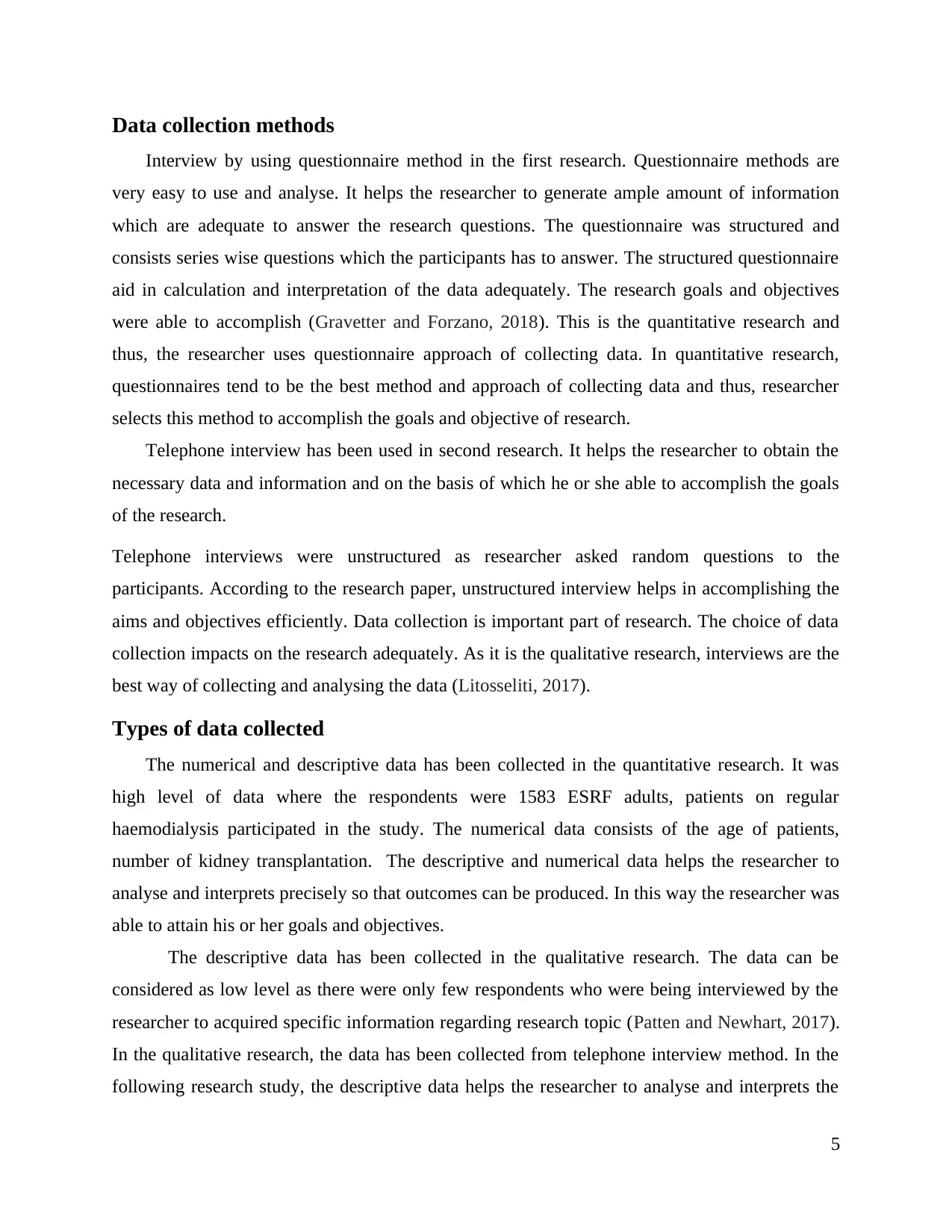
Data collection methods
Interview by using questionnaire method in the first research. Questionnaire methods are
very easy to use and analyse. It helps the researcher to generate ample amount of information
which are adequate to answer the research questions. The questionnaire was structured and
consists series wise questions which the participants has to answer. The structured questionnaire
aid in calculation and interpretation of the data adequately. The research goals and objectives
were able to accomplish (Gravetter and Forzano, 2018). This is the quantitative research and
thus, the researcher uses questionnaire approach of collecting data. In quantitative research,
questionnaires tend to be the best method and approach of collecting data and thus, researcher
selects this method to accomplish the goals and objective of research.
Telephone interview has been used in second research. It helps the researcher to obtain the
necessary data and information and on the basis of which he or she able to accomplish the goals
of the research.
Telephone interviews were unstructured as researcher asked random questions to the
participants. According to the research paper, unstructured interview helps in accomplishing the
aims and objectives efficiently. Data collection is important part of research. The choice of data
collection impacts on the research adequately. As it is the qualitative research, interviews are the
best way of collecting and analysing the data (Litosseliti, 2017).
Types of data collected
The numerical and descriptive data has been collected in the quantitative research. It was
high level of data where the respondents were 1583 ESRF adults, patients on regular
haemodialysis participated in the study. The numerical data consists of the age of patients,
number of kidney transplantation. The descriptive and numerical data helps the researcher to
analyse and interprets precisely so that outcomes can be produced. In this way the researcher was
able to attain his or her goals and objectives.
The descriptive data has been collected in the qualitative research. The data can be
considered as low level as there were only few respondents who were being interviewed by the
researcher to acquired specific information regarding research topic (Patten and Newhart, 2017).
In the qualitative research, the data has been collected from telephone interview method. In the
following research study, the descriptive data helps the researcher to analyse and interprets the
5
Interview by using questionnaire method in the first research. Questionnaire methods are
very easy to use and analyse. It helps the researcher to generate ample amount of information
which are adequate to answer the research questions. The questionnaire was structured and
consists series wise questions which the participants has to answer. The structured questionnaire
aid in calculation and interpretation of the data adequately. The research goals and objectives
were able to accomplish (Gravetter and Forzano, 2018). This is the quantitative research and
thus, the researcher uses questionnaire approach of collecting data. In quantitative research,
questionnaires tend to be the best method and approach of collecting data and thus, researcher
selects this method to accomplish the goals and objective of research.
Telephone interview has been used in second research. It helps the researcher to obtain the
necessary data and information and on the basis of which he or she able to accomplish the goals
of the research.
Telephone interviews were unstructured as researcher asked random questions to the
participants. According to the research paper, unstructured interview helps in accomplishing the
aims and objectives efficiently. Data collection is important part of research. The choice of data
collection impacts on the research adequately. As it is the qualitative research, interviews are the
best way of collecting and analysing the data (Litosseliti, 2017).
Types of data collected
The numerical and descriptive data has been collected in the quantitative research. It was
high level of data where the respondents were 1583 ESRF adults, patients on regular
haemodialysis participated in the study. The numerical data consists of the age of patients,
number of kidney transplantation. The descriptive and numerical data helps the researcher to
analyse and interprets precisely so that outcomes can be produced. In this way the researcher was
able to attain his or her goals and objectives.
The descriptive data has been collected in the qualitative research. The data can be
considered as low level as there were only few respondents who were being interviewed by the
researcher to acquired specific information regarding research topic (Patten and Newhart, 2017).
In the qualitative research, the data has been collected from telephone interview method. In the
following research study, the descriptive data helps the researcher to analyse and interprets the
5
Paraphrase This Document
Need a fresh take? Get an instant paraphrase of this document with our AI Paraphraser
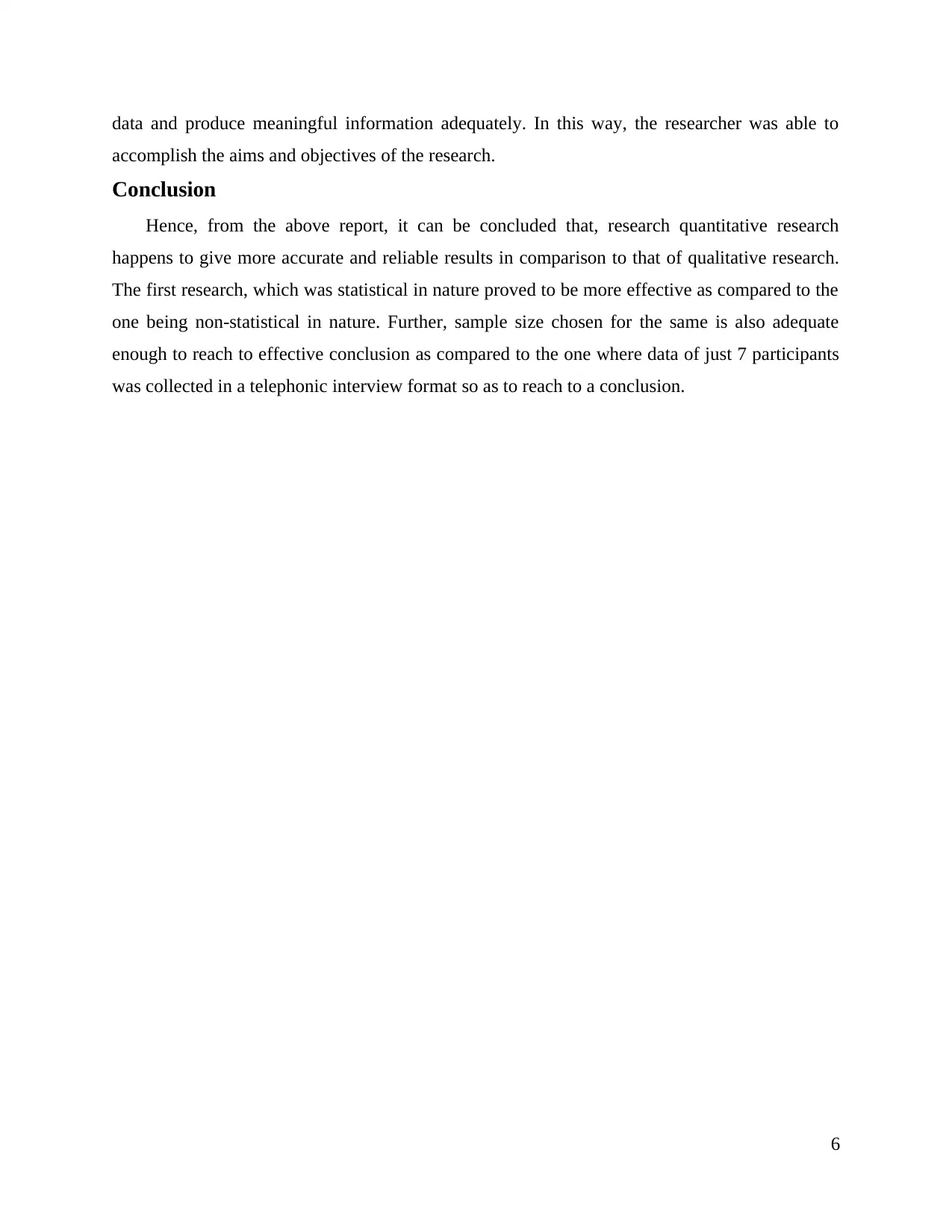
data and produce meaningful information adequately. In this way, the researcher was able to
accomplish the aims and objectives of the research.
Conclusion
Hence, from the above report, it can be concluded that, research quantitative research
happens to give more accurate and reliable results in comparison to that of qualitative research.
The first research, which was statistical in nature proved to be more effective as compared to the
one being non-statistical in nature. Further, sample size chosen for the same is also adequate
enough to reach to effective conclusion as compared to the one where data of just 7 participants
was collected in a telephonic interview format so as to reach to a conclusion.
6
accomplish the aims and objectives of the research.
Conclusion
Hence, from the above report, it can be concluded that, research quantitative research
happens to give more accurate and reliable results in comparison to that of qualitative research.
The first research, which was statistical in nature proved to be more effective as compared to the
one being non-statistical in nature. Further, sample size chosen for the same is also adequate
enough to reach to effective conclusion as compared to the one where data of just 7 participants
was collected in a telephonic interview format so as to reach to a conclusion.
6
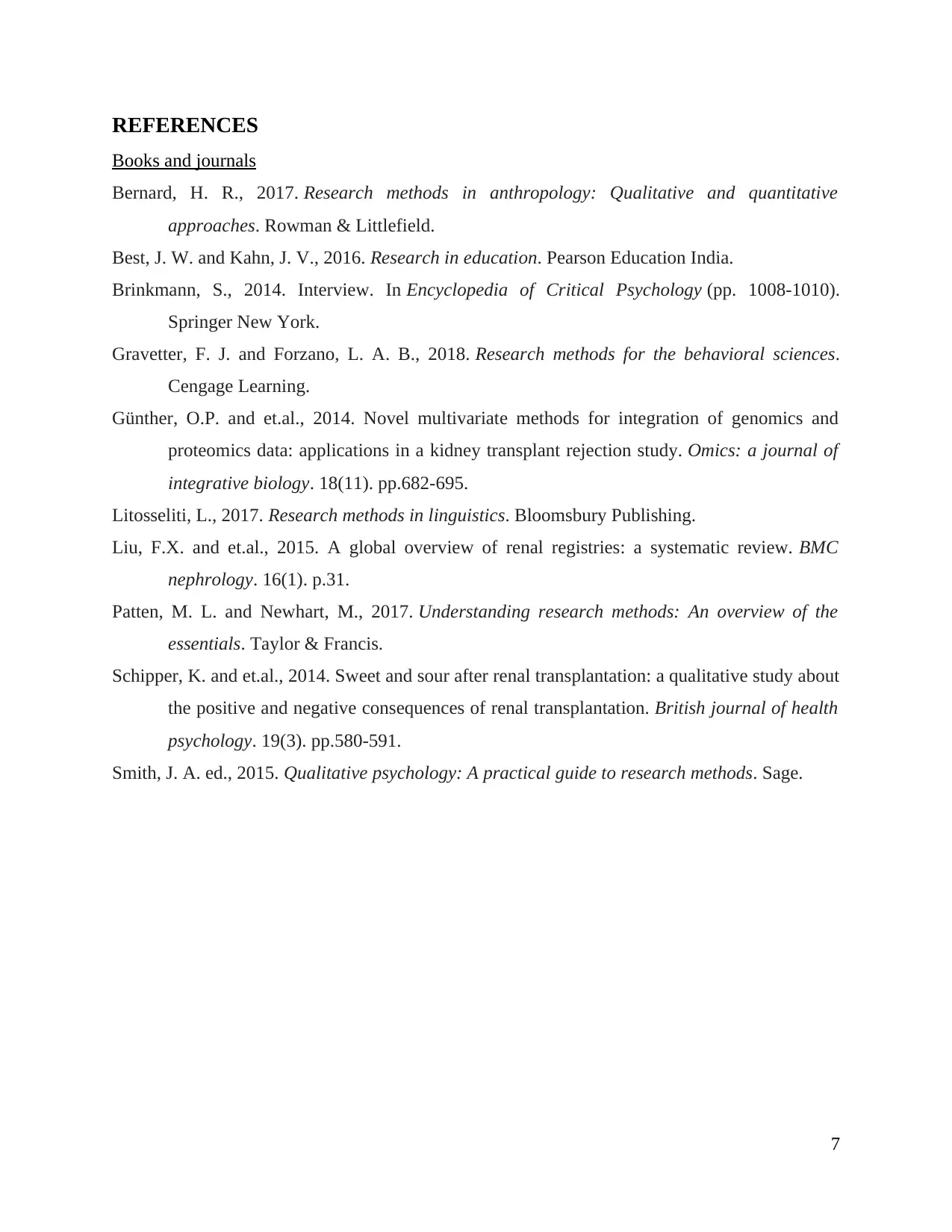
REFERENCES
Books and journals
Bernard, H. R., 2017. Research methods in anthropology: Qualitative and quantitative
approaches. Rowman & Littlefield.
Best, J. W. and Kahn, J. V., 2016. Research in education. Pearson Education India.
Brinkmann, S., 2014. Interview. In Encyclopedia of Critical Psychology (pp. 1008-1010).
Springer New York.
Gravetter, F. J. and Forzano, L. A. B., 2018. Research methods for the behavioral sciences.
Cengage Learning.
Günther, O.P. and et.al., 2014. Novel multivariate methods for integration of genomics and
proteomics data: applications in a kidney transplant rejection study. Omics: a journal of
integrative biology. 18(11). pp.682-695.
Litosseliti, L., 2017. Research methods in linguistics. Bloomsbury Publishing.
Liu, F.X. and et.al., 2015. A global overview of renal registries: a systematic review. BMC
nephrology. 16(1). p.31.
Patten, M. L. and Newhart, M., 2017. Understanding research methods: An overview of the
essentials. Taylor & Francis.
Schipper, K. and et.al., 2014. Sweet and sour after renal transplantation: a qualitative study about
the positive and negative consequences of renal transplantation. British journal of health
psychology. 19(3). pp.580-591.
Smith, J. A. ed., 2015. Qualitative psychology: A practical guide to research methods. Sage.
7
Books and journals
Bernard, H. R., 2017. Research methods in anthropology: Qualitative and quantitative
approaches. Rowman & Littlefield.
Best, J. W. and Kahn, J. V., 2016. Research in education. Pearson Education India.
Brinkmann, S., 2014. Interview. In Encyclopedia of Critical Psychology (pp. 1008-1010).
Springer New York.
Gravetter, F. J. and Forzano, L. A. B., 2018. Research methods for the behavioral sciences.
Cengage Learning.
Günther, O.P. and et.al., 2014. Novel multivariate methods for integration of genomics and
proteomics data: applications in a kidney transplant rejection study. Omics: a journal of
integrative biology. 18(11). pp.682-695.
Litosseliti, L., 2017. Research methods in linguistics. Bloomsbury Publishing.
Liu, F.X. and et.al., 2015. A global overview of renal registries: a systematic review. BMC
nephrology. 16(1). p.31.
Patten, M. L. and Newhart, M., 2017. Understanding research methods: An overview of the
essentials. Taylor & Francis.
Schipper, K. and et.al., 2014. Sweet and sour after renal transplantation: a qualitative study about
the positive and negative consequences of renal transplantation. British journal of health
psychology. 19(3). pp.580-591.
Smith, J. A. ed., 2015. Qualitative psychology: A practical guide to research methods. Sage.
7
⊘ This is a preview!⊘
Do you want full access?
Subscribe today to unlock all pages.

Trusted by 1+ million students worldwide
1 out of 9
Related Documents
Your All-in-One AI-Powered Toolkit for Academic Success.
+13062052269
info@desklib.com
Available 24*7 on WhatsApp / Email
![[object Object]](/_next/static/media/star-bottom.7253800d.svg)
Unlock your academic potential
Copyright © 2020–2026 A2Z Services. All Rights Reserved. Developed and managed by ZUCOL.




